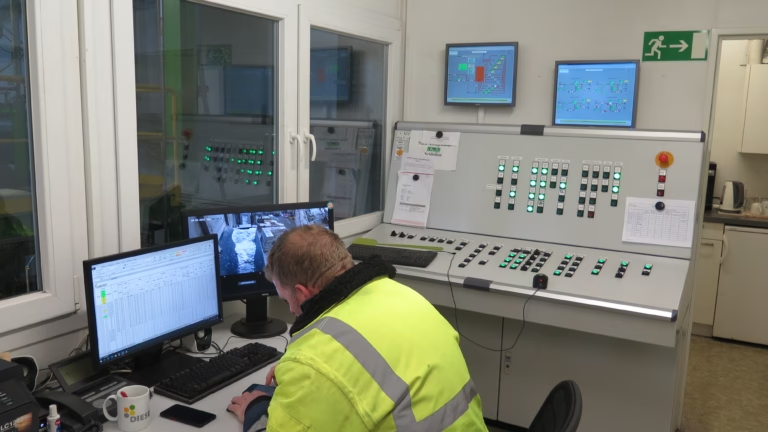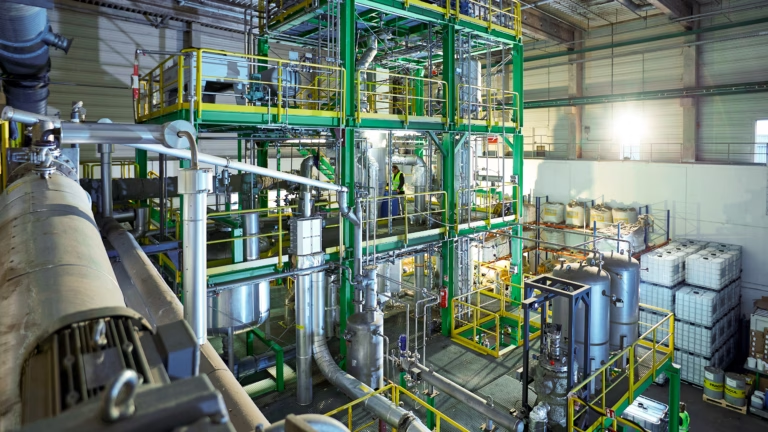Technology & Know-How
A team with many years of experience

Joint development
carboliq GmbH provides the technology platform for application of the patented liquefaction process developed by RECENSO GmbH for high-calorific waste.
The company is a joint venture between the plant engineering firm RECENSO and SÜDPACK, a mid-sized manufacturer of film packaging. As a pioneer in the recovery of plastic waste as a valuable resource, carboliq enables true closed-loop recycling for plastics.
carboliq develops modular systems for the direct liquefaction of waste. These systems are implemented by international plant engineering companies in accordance with defined requirements.
Companies can test their waste streams at the pilot plant in advance to obtain a process guarantee.

Unique pilot plant for chemical recycling
carboliq operates a large-scale pilot plant at the Ennigerloh waste disposal centre in Münsterland. This was designed for the processing of substitute fuels (EBS). These are produced by the municipal company ECOWEST from commercial waste, sorting residues and household waste for use in cement kilns and combined heat and power plants.
As a specialist waste management company, the operating company CARBOWEST is authorised to accept and treat waste. The oil extraction plant has been approved in accordance with the Federal Immission Control Act (BImSchG) and tested in fully continuous operation.
The carboliq pilot plant has been running 24/7 since the beginning of 2021. Since then, mixed and contaminated plastic waste has been successfully oiled in campaigns and the technology has been developed to industrial maturity under real conditions.
Experts from the Federal Environment Agency accompanied several campaigns in 2023 and confirmed the balance sheet values. They rated the technology as ‘TRL 8’, i.e. mature and functional. The plant technology has been optimized for continuous use in waste management, has a long service life and processes 1,200 to 1,500 tons of plastic waste annually. Several hundred tons of Circular Liquid Resource (CLR®) are delivered to the petrochemical industry each year, where they serve as raw material for the production of new high-quality polymers.
Apply carboliq technology to your business!
We provide expert support in planning and building a customized oiling plant, and offer companies with their own technical capabilities the opportunity to license our innovative technology.
Economic efficiency and location advantages
Installing an oiling plant becomes economically viable from an output capacity of 10,000 metric tons of liquid secondary raw material per year. The business case based on the carboliq pilot plant demonstrates a positive operating result.
carboliq plans to install plants at sites with sufficient volumes of suitable waste. Modular core units can be integrated into existing waste incineration facilities or decommissioned coal-fired power plants, helping to reduce capital expenditure (CapEx).
Advantages of operating a carboliq plant
✔ Innovative technology: In partnership with c4future, carboliq is pioneering the world’s first industrial-scale advanced thermochemical process for converting plastic waste into liquid resources. It is suitable for both mixed and contaminated plastics and makes an active contribution to reducing environmental pollution.
✔ Strong economic potential: carboliq is building a value-generating recycling infrastructure for Europe. The transformation of plastic waste into a valuable resource is driving the development of new regional and global business models.
✔ Reduced dependence on fossil resources: Europe imports vast quantities of fossil hydrocarbons. Recycled CLR® is a fully viable substitute for fossil raw materials and helps reduce economic dependency.
✔ Decentralized value creation: The transformation of plastic waste into a useful resource can create market-driven incentives to increase sustainable utilization. Many regions already have at least one recycling facility per one million inhabitants – facilities that could be adapted for use in plastic liquefaction.